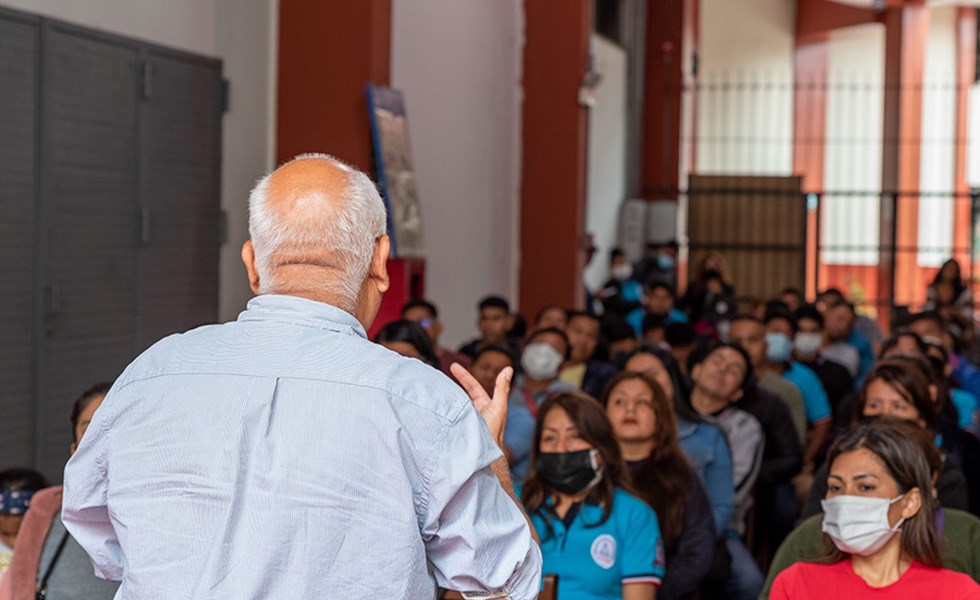Preface
Annual Report 2022
Everyone has the right to fair working conditions, a living wage, social protection, and collective bargaining, but in many countries these barely exist, if at all. That is why, together with workers, their trade unions and NGOs that support workers’ rights, we strive for a world in which strong unions are enabled to ensure decent work for all.

Peru: Samuel Machacuay gives training on social dialogue. Photo: Roderick Polak.
Systemic change
Systemic change: one of those ‘buzz phrases ’ going round at the moment: a change that is sustainable and that affects an entire system. However you call it, sustained support over the last 10 years has enabled us to achieve a change in Peru that’s irreversible: the development of social dialogue between employers and employees. And it’s rightly termed a systematic change. It was a process requiring time and patience, from conflict to win-win, and from distrust to trust between people. As Samuel, our support and anchor in Peru, says: ‘When I look back on ten years of social dialogue in Peru, then it’s the people I think of: they are the soul of the change.’ The story of 10 years of building social dialogue is one of the inspiring stories in this annual report for 2022.
Social dialogue success in Somalia
Thousands of kilometres further away, in Somalia, social dialogue has also been of great benefit to the workers. Despite the situation of an active civil war, the trade union has built up a solid, close relationship with the employer’s organisation. The Somali trade union leader Omar Faruk Osman speaks about the importance of tripartite social dialogue in improving the social protection of employees and in developing towards a more inclusive and democratic society in Somalia. Unfortunately, trade union work doesn’t get done without a struggle. For him it was at the price of being arrested and attacked.
Improve the position of workers
Our mission is to improve the position of workers particularly in countries in the global south. We do this by helping set up and strengthen democratic and inclusive trade unions, and by fighting labour rights violations. And by promoting negotiations and social dialogue and by lobbying, campaigns and actions.
Trade unions professionalised
However, a trade union can’t exist without members or without funds. One of our most important results in 2022 was the ELSA training programme, which has contributed to the professionalisation of trade unions in Uganda. The programme focused on increasing the strategic and financial capacity of young trade union leaders and up-and-coming trade union talent, to ensure that the trade unions may look forward to a sustainable future. This is an approach that we want to extend to other trade unions and countries.
Observatory for a just energy transition
Another important milestone that was reached in in 2022 was the establishment of the Colombian Observatory for a just energy transition. This institute carries out research into and develops policy proposals on the future of the energy sector coupled with labour rights. It has been successful in increasing awareness on the issue.
First trade union for LGBTIQ+
Last but not least, we are proud of our support for the establishment of the first trade union for LGBTIQ+ workers in South Asia. The trade union was established in Sri Lanka with the aim of promoting the rights of LGBTIQ+ workers and tackling the discrimination and harassment that they are confronted with at their workplace. We hope that this will inspire the development of initiatives in other countries.
These are just a few examples of the work carried out by our partners in 2022. Be sure to read on for more!
Thanks to all our partners, donors and stakeholders
Finally, we wish to express our thanks to all our partners, donors and stakeholders, who have supported us in our work over the past year. We continue to work to stand up for the rights of workers all over the world and we look forward to continuing our work in the coming years.
For your convenience, we have also created a printable pdf.
Tuur Elzinga, president and Karen Brouwer, managing director
Mondiaal FNV

Tuur Elzinga, Karen Brouwer,
President Managing Director
